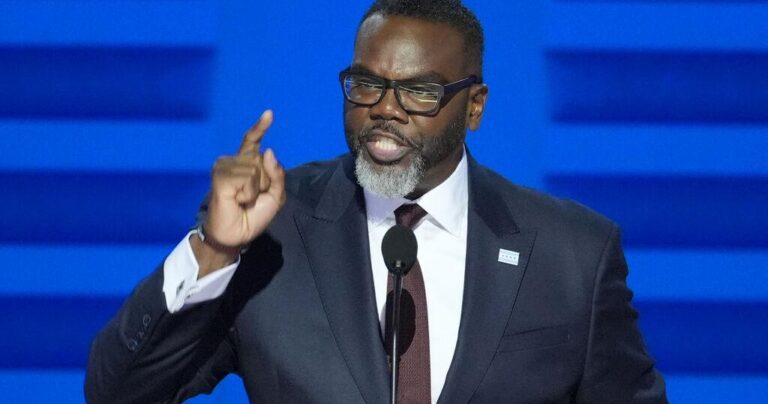As the Democratic National Convention in Chicago approached, many party supporters were anxious. The party was returning to a city where it had been left in a terrible position in 1968 by Mayor Richard J. Daley’s authoritarian response to anti-Vietnam War protests. A few weeks later, Democratic candidate Hubert Humphrey had narrowly lost to Republican Richard Nixon.
Daley’s brutal crackdown on the opposition—which Connecticut Democratic Senator Abraham Ribicoff called “Gestapo tactics on the streets of Chicago” because of the violence Chicago officers unleashed on young antiwar protesters—created a sense of chaos that was palpable not only on the streets but also in the convention hall. According to a Washington Post account of the events, Daley shouted obscenities at Ribicoff from the floor. As the fights broke out among the delegates, “Hodding Carter said he left Chicago knowing that it was a disaster, because the average American would look at the Democrats and conclude, ‘This is a party that has lost its mind.’”
In June of this year, as large protests were planned against President Biden’s failure to withdraw U.S. support for Israel’s brutal assault on Gaza—in which more than 40,000 Palestinian civilians, mostly women and children, have been killed—and as speculation about a troubled 2024 convention began to peak, I sat down to talk with Chicago’s current mayor, Brandon Johnson.
Johnson, a 48-year-old progressive who won the 2023 mayoral election by building a multiracial, multi-ethnic coalition in favor of new city politics, was calm and confident. He knew that party insiders, critics, delegates and protesters would be gathering in Chicago. But he wasn’t worried.
Recalling his record as a union leader and activist who organized his share of protests before becoming the 57th mayor of Chicago, he explained: “You have someone like me who is so deeply connected to grassroots movements and political organizing and faith and action. I’ve stood with many of the individuals who are applying for permits to protest. And we’re going to have delegates and people coming from all over the world to not only celebrate the leadership of President Biden and Vice President Harris, but also to push us to the next level with some energy, right? So we’re talking about safe, peaceful protests with an active, vibrant convention.”
That's the kind of response to tough circumstances we've come to expect from Johnson, who will be a featured guest at next week's Capital Times Idea Fest — appearing on September 16 at 6 p.m. as part of a Monday night bill that will also feature former House Speaker Nancy Pelosi.
A conversation with Johnson will give Ideas Festival attendees the opportunity to meet a prominent and dynamic new leader in American politics. A history-savvy but determined to steer the arc toward economic, social, and racial justice and peace—he cast a decisive vote in favor of Chicago’s call for a ceasefire in Gaza—Johnson is one of America’s most engaging thinkers on urban politics and the broader work of government.
Johnson is the first to admit that the work can be daunting: Just a year ago, he took over a great American city that had suffered for years from gun violence and budget deficits. But he is also committed to a long-term vision that applies new and innovative approaches to old problems.
Johnson wants to stop making the mistakes of the past. This was clear as the conference approached.
When I asked him specifically about the comparisons to 1968 and whether he was concerned about media speculation about chaos in 2024, Johnson smiled knowingly and said, “No, because I’m different from the mayor who was there during that time. So there’s a very different approach that I’m going to take — again, peaceful and safe but active and energetic, all at the same time. The First Amendment is not only fundamental to our democracy; black liberation is not possible or even real without the ability to protest the government. And so, for me, we can show up at the convention and put forward our vision for the working people of this city, while listening to the voices of the protesters who want to reach a broad swath of the leadership that makes up the Democratic Party.”
Johnson struck the right balance then, and he continued to do so as convention attendees and protesters arrived, contributing strongly to a convention week in which, despite the expected challenges, voices of opposition mixed with enthusiastic support for the Kamala Harris-Tim Walz ticket. Chicago received high marks from Democrats, who left feeling their fall campaign had been boosted.
Mayors get a lot of blame when things go wrong. But they don’t usually get the credit when things go right. But it’s important to note that Brandon Johnson made sure things went well—for Harris, Walz, and the First Amendment—when the Democratic National Convention convened in Chicago this summer.
John Nichols is the associate editor of the Capital Times. jnichols@captimes.com and @NicholsUprising.
Share your thoughts on this story by sending a letter to the editor at tctvoice@madison.com. Include your full name, hometown and phone number. Your name and hometown will be published. Phone number is for verification purposes only. Please keep your letter to 250 words or less.
